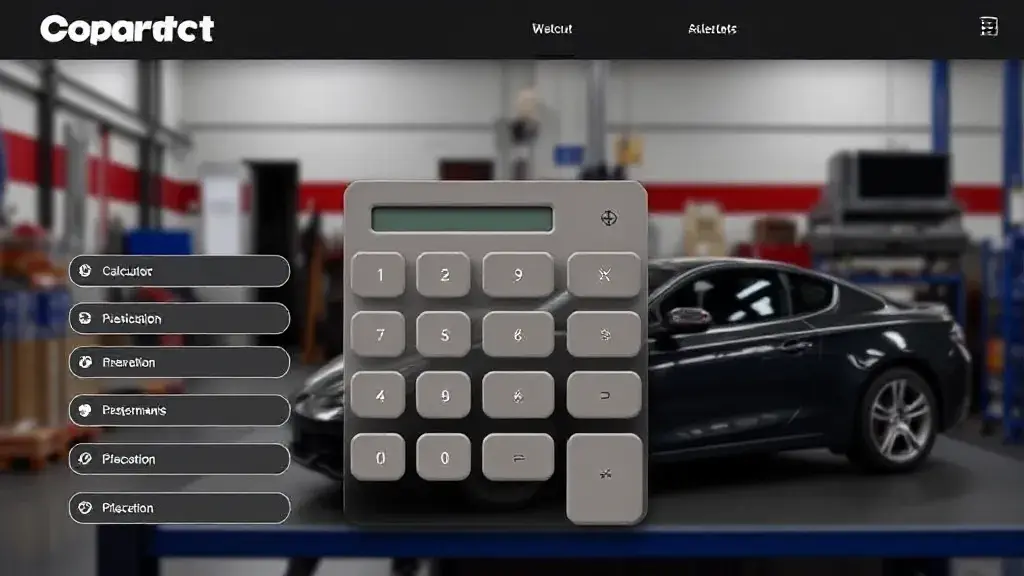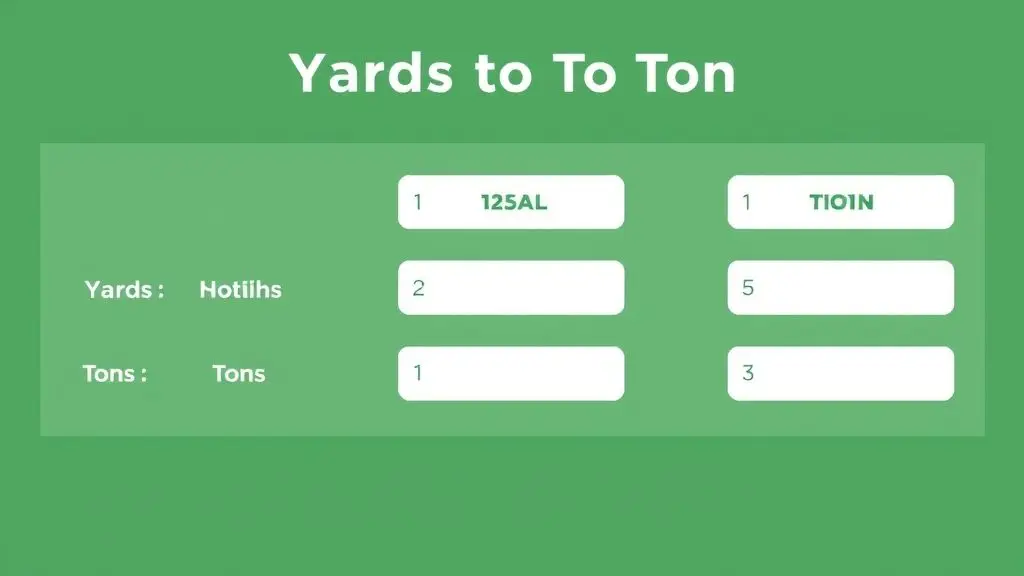Yards to Tons Calculator
*Note: This calculator assumes material density of 1.6 tons per cubic yard (common for gravel).Yards to Tons Calculator: The Ultimate Guide to Converting Yards to Tons Accurately
If you have ever needed to convert cubic yards into tons, you know that the process can sometimes be confusing and tricky. That’s where a yards to tons calculator becomes an essential tool, helping you make accurate and quick conversions. Whether you’re working in construction, landscaping, or material estimation, this calculator simplifies your task by doing the heavy math for you.
In this ultimate guide, we will dive deep into the concept of converting yards to tons, the importance of such conversions, how a yards to tons calculator works, the common materials involved, and much more. By the end of this article, you’ll be fully equipped to understand and use a yards to tons calculator effectively.
What Is a Yards to Tons Calculator?
A yards to tons calculator is an online or digital tool designed to convert volumes measured in cubic yards (yd³) into weights measured in tons. This conversion is critical for many industries such as construction, mining, landscaping, and agriculture where materials are commonly ordered and measured in different units.
Since a cubic yard measures volume, and a ton measures weight, the conversion is not straightforward and depends heavily on the density of the material being measured. This is why the yards to tons calculator typically includes a density value (tons per cubic yard) to provide an accurate conversion.
Why Is Converting Yards to Tons Important?
Understanding how many tons correspond to a certain volume in cubic yards is vital for several reasons:
- Cost Estimation: Suppliers often price materials by weight (tons), but job site measurements may be in volume (yards³). Accurate conversion helps with budgeting.
- Logistics and Transportation: Knowing the weight of materials affects how you plan transportation — truck load limits, safety regulations, and delivery costs.
- Material Ordering: Overestimating or underestimating quantities can lead to project delays or surplus materials.
- Project Planning: Accurate yard-to-ton conversions help in estimating the quantity of materials needed for concrete, soil, gravel, mulch, sand, and more.
The yards to tons calculator simplifies this process by giving you the weight equivalent for any volume you input, using the right density.
How Does a Yards to Tons Calculator Work?
Since cubic yards and tons measure different things (volume vs weight), the calculator needs an intermediate conversion factor — material density.
Formula:
Weight (tons) = Volume (cubic yards) × Density (tons per cubic yard)
- Volume: The amount of space material occupies, measured in cubic yards.
- Density: The weight per cubic yard of a specific material.
Different materials have different densities, so the calculator often allows you to select or input the density based on the material you are working with. For example:
| Material | Density (tons per cubic yard) |
|---|---|
| Gravel | 1.6 |
| Sand | 1.4 |
| Topsoil | 1.2 |
| Mulch | 0.5 |
| Concrete (wet) | 4.0 |
| Asphalt | 2.0 |
The yards to tons calculator multiplies the cubic yards by the corresponding density to get the weight in tons.
Common Applications of a Yards to Tons Calculator
A yards to tons calculator is used in many fields. Let’s look at some common applications:
1. Construction Industry
In construction, ordering bulk materials like gravel, sand, concrete, or soil requires volume-to-weight conversions. Truckloads are often limited by weight, so you need to know how many tons correspond to your volume order.
2. Landscaping
Landscape architects and contractors often buy materials like mulch, soil, and decorative rock by volume but need to plan transport and cost based on weight.
3. Mining and Quarrying
Mining operations calculate tons from yards to estimate ore extraction weights and manage logistics.
4. Agriculture
Farmers convert hay, fertilizer, or soil amendments from volume to weight to optimize storage and usage.
Step-by-Step Guide to Using a Yards to Tons Calculator
Using a yards to tons calculator is straightforward but requires understanding the inputs.
Step 1: Measure Your Volume in Cubic Yards
Calculate or obtain the volume of material you have or need in cubic yards. This might involve measuring length, width, and height for rectangular spaces or using formulas for irregular shapes.
Step 2: Select the Material
Choose the material you are converting, or input its density manually if your calculator allows it.
Step 3: Input the Volume into the Calculator
Enter the cubic yards value into the calculator’s input field.
Step 4: Calculate the Weight in Tons
Click the calculate button, and the calculator will multiply volume by density, providing the weight in tons.

Density: The Key to Accurate Yards to Tons Conversion
Since the conversion depends on density, understanding this property is crucial.
- Density is the mass per unit volume, often expressed as tons per cubic yard.
- Different materials have vastly different densities.
- Moisture content, compaction, and particle size can affect density.
For example, dry sand has a density around 1.3 tons per cubic yard, but wet sand can be much heavier. Similarly, mulch is much lighter, usually about 0.5 tons per cubic yard.
When using a yards to tons calculator, be sure to use the correct density for your specific material and conditions.
How to Calculate Cubic Yards
If you don’t know the cubic yards and need to calculate it before using a yards to tons calculator, here are some formulas:
- Rectangular area:
Cubic yards = (Length × Width × Height) / 27(Since 1 cubic yard = 27 cubic feet) - Cylindrical volume:
Cubic yards = (π × radius² × height) / 27
Make sure your measurements are in feet for these formulas to work correctly.
Examples of Yards to Tons Conversion Using a Calculator
Example 1: Gravel
You have 10 cubic yards of gravel. The density of gravel is about 1.6 tons per cubic yard.
Using the formula:
Weight = 10 yd³ × 1.6 tons/yd³ = 16 tons
A yards to tons calculator will give you this result instantly.
Example 2: Mulch
You want to know the weight of 5 cubic yards of mulch. Mulch density = 0.5 tons per cubic yard.
Weight = 5 yd³ × 0.5 tons/yd³ = 2.5 tons
Benefits of Using an Online Yards to Tons Calculator
1. Saves Time and Effort
Manual conversions require knowing densities and doing calculations. The calculator automates this instantly.
2. Increases Accuracy
Minimizes human error in calculations, especially with complex decimals or large volumes.
3. User-Friendly
Most calculators are intuitive with input fields and preset material densities.
4. Portable and Accessible
Use anywhere with internet access or embed calculators into websites for client use.
Customizing Your Yards to Tons Calculator for Your Needs
Not all materials have the same density, so the best calculators let you:
- Select common materials from a dropdown.
- Input a custom density if you know it.
- Adjust units if needed (e.g., convert cubic meters to cubic yards).
If you have special materials or unusual densities, custom calculators or spreadsheet formulas can be made for precise calculations.
Common Mistakes to Avoid When Converting Yards to Tons
- Using wrong density: Always check the material and moisture condition.
- Ignoring compaction: Loose and compacted materials have different densities.
- Mixing units: Ensure your input volume is in cubic yards and the density matches tons per cubic yard.
- Assuming uniform material: Some materials have layers with different densities.
Integrating a Yards to Tons Calculator Into Your Website
If you own a business dealing with bulk materials, adding a yards to tons calculator to your site can improve customer experience.
- Use simple HTML, CSS, and JavaScript tools.
- Make it responsive for mobile users.
- Customize colors to match your brand (like green for eco-friendly brands).
- Keep the design isolated to prevent interference with your site header/footer.
How to Choose the Right Yards to Tons Calculator
Look for calculators that:
- Support multiple materials with preset densities.
- Allow custom density input.
- Are mobile-friendly and responsive.
- Provide clear, easy-to-understand results.
- Include explanations or help text for users.
Advanced: Using Formulas for Bulk Calculations Without a Calculator
If you prefer Excel or Google Sheets:
- Create a column for cubic yards.
- Another column for density.
- Use a formula:
=Volume * Densityto get tons.
You can build your own yards to tons calculator spreadsheet for batch calculations.
Summary: Why You Should Use a Yards to Tons Calculator Today
A yards to tons calculator is essential for anyone working with bulk materials. It simplifies complex volume-to-weight conversions, helps avoid costly mistakes, and ensures efficient project planning.
By understanding the role of density and how to calculate volumes properly, you can use the calculator confidently to get accurate results every time.
Frequently Asked Questions About Yards to Tons Calculator
Q1: Can I use the calculator for any material?
A: Yes, if you know the material’s density in tons per cubic yard. Otherwise, use standard density values for common materials.
Q2: Why is the density value important?
A: Density links volume and weight. Incorrect density leads to wrong conversions.
Q3: Is a cubic yard the same everywhere?
A: Yes, a cubic yard is a standard unit equal to 27 cubic feet.
Q4: How to convert tons to cubic yards?
A: Divide the weight by the material’s density.
Q5: Are there different types of tons?
A: Yes. This calculator typically uses the US short ton (2000 lbs). For metric tons (1000 kg), adjust the density accordingly.
Conclusion
Mastering the conversion between cubic yards and tons is easier than ever with a reliable yards to tons calculator. It helps you make quick, accurate decisions whether you’re ordering materials, estimating costs, or planning logistics.
Invest time in understanding densities and volumes, and leverage a calculator designed to streamline your work. Whether you’re a contractor, landscaper, or DIY enthusiast, a yards to tons calculator is your handy companion for all bulk material conversions.
Keywords used:
- yards to tons calculator
- yards to tons
- cubic yards to tons
- convert yards to tons
- yards to tons conversion
- tons per cubic yard calculator
- convert cubic yards to tons
